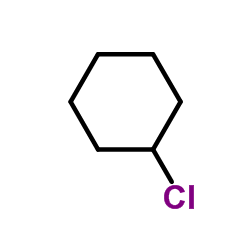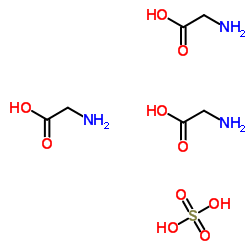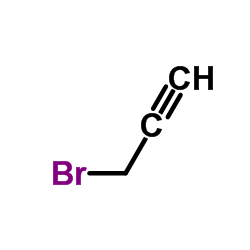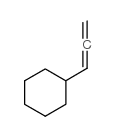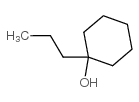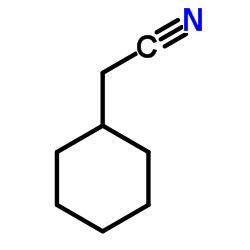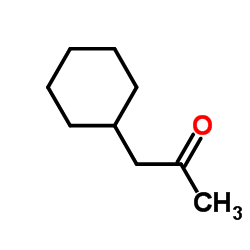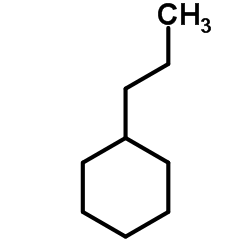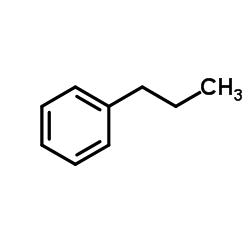17715-00-3
| 中文名 | 3-环己基-1-丙炔 |
|---|---|
| 英文名 | prop-2-ynylcyclohexane |
| 中文别名 |
2-炔丙基环己烷
3-环己基丙炔 |
| 英文别名 |
3-Cyclohexylpropyne
prop-2-yn-1-ylcyclohexane MFCD00041562 Propyne,3-cyclohexyl 3-Cyclohexyl-1-propyne 2-Propynylcyclohexane 1-Prop-2-ynylcyclohexane cyclohexylmethylacetylene 3-cyclohexyl-prop-1-yne Cyclohexane,2-propynyl |
| 密度 | 0.845 g/mL at 25 °C(lit.) |
|---|---|
| 沸点 | 157-158 °C(lit.) |
| 分子式 | C9H14 |
| 分子量 | 122.20700 |
| 闪点 | 95 °F |
| 精确质量 | 122.11000 |
| LogP | 2.59000 |
| 蒸汽压 | 1.92mmHg at 25°C |
| 折射率 | n20/D 1.4590(lit.) |
| 储存条件 | 常温密闭避光,通风干燥 |
| 稳定性 | 常温常压下稳定 避免的物料:氧化物 |
| 分子结构 | 1、 摩尔折射率:39.45 2、 摩尔体积(m3/mol):144.2 3、 等张比容(90.2K):343.1 4、 表面张力(dyne/cm):31.9 5、 介电常数(F/m):2.46 6、 极化率(10-24cm3):15.64 |
| 计算化学 | 1.疏水参数计算参考值(XlogP):3.5 2.氢键供体数量:0 3.氢键受体数量:0 4.可旋转化学键数量:1 5.互变异构体数量:无 6.拓扑分子极性表面积0 7.重原子数量:9 8.表面电荷:0 9.复杂度:109 10.同位素原子数量:0 11.确定原子立构中心数量:0 12.不确定原子立构中心数量:0 13.确定化学键立构中心数量:0 14.不确定化学键立构中心数量:0 15.共价键单元数量:1 |
| 更多 | 1. 性状:无色液体 2. 密度(g/mL,25/4℃):0.845(lit.) 3. 相对蒸汽密度(g/mL,空气=1):不确定 4. 熔点(ºC):不确定 5. 沸点(ºC,常压):157-158(lit.) 6. 沸点(ºC, 5.2kPa):不确定 7. 折射率:n 20/D 1.4590(lit.) 8. 闪点(ºF):95 9. 比旋光度(º):不确定 10. 自燃点或引燃温度(ºC):不确定 11. 蒸气压(kPa,25ºC):不确定 12. 饱和蒸气压(kPa,60ºC):不确定 13. 燃烧热(KJ/mol):不确定 14. 临界温度(ºC):不确定 15. 临界压力(KPa):不确定 16. 油水(辛醇/水)分配系数的对数值:不确定 17. 爆炸上限(%,V/V):不确定 18. 爆炸下限(%,V/V):不确定 19. 溶解性:不确定 |
|
Section1. IDENTIFICATION OF THE SUBSTANCE/MIXTURE Product name: 3-Cyclohexyl-1-propyne Section2. HAZARDS IDENTIFICATION Classification of the substance or mixture According to Regulation (EC) No1272/2008 Flammable liquids (Category 3) Acute toxicity, Oral (Category 4)
Serious eye damage (Category 1) According to European Directive 67/548/EEC as amended. Harmful if swallowed. Risk of serious damage to eyes. Flammable. Label elements Pictogram Signal wordDanger Hazard statement(s) H226Flammable liquid and vapour. H302Harmful if swallowed. H318Causes serious eye damage. Precautionary statement(s) P280Wear protective gloves/ eye protection/ face protection. P305 + P351 + P338IF IN EYES: Rinse cautiously with water for several minutes. Remove contact lenses, if present and easy to do. Continue rinsing. Hazard symbol(s) XnHarmful R-phrase(s) R22Harmful if swallowed. R41Risk of serious damage to eyes. R10Flammable. S-phrase(s) S26In case of contact with eyes, rinse immediately with plenty of water and seek medical advice. S36Wear suitable protective clothing. S16Keep away from sources of ignition - No smoking. Other hazards - none Section3. COMPOSITION/INFORMATION ON INGREDIENTS Formula: C9H14 Molecular Weight: 122,21 g/mol CAS-No.EC-No.Index-No.ClassificationConcentration 3-Cyclohexyl-1-propyne 17715-00-3--Flam. Liq. 3; Acute Tox. 4;- Eye Dam. 1; H226, H302, H318 Xn, R22 - R41 - R10 For the full text of the H-Statements mentioned in this Section, see Section 16. Section4. FIRST AID MEASURES General advice Consult a physician. Show this safety data sheet to the doctor in attendance. If inhaled If breathed in, move person into fresh air. If not breathing, give artificial respiration. Consult a physician. In case of skin contact Wash off with soap and plenty of water. Consult a physician. In case of eye contact Rinse thoroughly with plenty of water for at least 15 minutes and consult a physician. If swallowed Do NOT induce vomiting. Never give anything by mouth to an unconscious person. Rinse mouth with water. Consult a physician. Section5. FIRE-FIGHTING MEASURES Suitable extinguishing media For small (incipient) fires, use media such as "alcohol" foam, dry chemical, or carbon dioxide. For large fires, apply water from as far as possible. Use very large quantities (flooding) of water applied as a mist or spray; solid streams of water may be ineffective. Cool all affected containers with flooding quantities of water. Special protective equipment for fire-fighters Wear self contained breathing apparatus for fire fighting if necessary. Further information Use water spray to cool unopened containers. Section6. ACCIDENTAL RELEASE MEASURES Personal precautions Use personal protective equipment. Avoid breathing vapors, mist or gas. Ensure adequate ventilation. Remove all sources of ignition. Evacuate personnel to safe areas. Beware of vapours accumulating to form explosive concentrations. Vapours can accumulate in low areas. Environmental precautions Prevent further leakage or spillage if safe to do so. Do not let product enter drains. Methods and materials for containment and cleaning up Contain spillage, and then collect with an electrically protected vacuum cleaner or by wet-brushing and place in container for disposal according to local regulations (see section 13). Section7. HANDLING AND STORAGE Precautions for safe handling Avoid contact with skin and eyes. Avoid inhalation of vapour or mist. Keep away from sources of ignition - No smoking. Take measures to prevent the build up of electrostatic charge. Conditions for safe storage Keep container tightly closed in a dry and well-ventilated place. Containers which are opened must be carefully resealed and kept upright to prevent leakage. Store in cool place. Section8. EXPOSURE CONTROLS/PERSONAL PROTECTION Personal protective equipment Respiratory protection Where risk assessment shows air-purifying respirators are appropriate use a full-face respirator with multi-purpose combination (US) or type ABEK (EN 14387) respirator cartridges as a backup to engineering controls. If the respirator is the sole means of protection, use a full-face supplied air respirator. Use respirators and components tested and approved under appropriate government standards such as NIOSH (US) or CEN (EU). Hand protection Handle with gloves. Gloves must be inspected prior to use. Use proper glove removal technique (without touching glove's outer surface) to avoid skin contact with this product. Dispose of contaminated gloves after use in accordance with applicable laws and good laboratory practices. Wash and dry hands. The selected protective gloves have to satisfy the specifications of EU Directive 89/686/EEC and the standard EN 374 derived from it. Eye protection Tightly fitting safety goggles. Faceshield (8-inch minimum). Use equipment for eye protection tested and approved under appropriate government standards such as NIOSH (US) or EN 166(EU). Skin and body protection Complete suit protecting against chemicals, Flame retardant antistatic protective clothing, The type of protective equipment must be selected according to the concentration and amount of the dangerous substance at the specific workplace. Hygiene measures Handle in accordance with good industrial hygiene and safety practice. Wash hands before breaks and at the end of workday. Section9. PHYSICAL AND CHEMICAL PROPERTIES Appearance Formliquid Colourcolourless Safety data pHno data available Melting pointno data available Boiling point157 - 158 °C - lit. Flash point35 °C - closed cup Ignition temperatureno data available Lower explosion limitno data available Upper explosion limitno data available Density0,845 g/cm3 at 25 °C Water solubilityno data available Partition coefficient:log Pow: 3,06 n-octanol/water Section10. STABILITY AND REACTIVITY Chemical stability Stable under recommended storage conditions. Conditions to avoid Heat, flames and sparks. Materials to avoid Strong oxidizing agents Hazardous decomposition products Hazardous decomposition products formed under fire conditions. - Carbon oxides Section11. TOXICOLOGICAL INFORMATION Acute toxicity no data available Skin corrosion/irritation no data available Serious eye damage/eye irritation no data available Respiratory or skin sensitization no data available Germ cell mutagenicity no data available Carcinogenicity IARC: No component of this product present at levels greater than or equal to 0.1% is identified as probable, possible or confirmed human carcinogen by IARC. Reproductive toxicity no data available Specific target organ toxicity - single exposure no data available Specific target organ toxicity - repeated exposure no data available Aspiration hazard no data available Potential health effects InhalationMay be harmful if inhaled. May cause respiratory tract irritation. IngestionHarmful if swallowed. SkinMay be harmful if absorbed through skin. May cause skin irritation. EyesCauses eye burns. Signs and Symptoms of Exposure To the best of our knowledge, the chemical, physical, and toxicological properties have not been thoroughly investigated. Additional Information RTECS: UK4725000 Section12. ECOLOGICAL INFORMATION Toxicity no data available Persistence and degradability no data available Bioaccumulative potential no data available Mobility in soil no data available PBT and vPvB assessment no data available Other adverse effects no data available Section13. DISPOSAL CONSIDERATIONS Product Burn in a chemical incinerator equipped with an afterburner and scrubber but exert extra care in igniting as this material is highly flammable. Offer surplus and non-recyclable solutions to a licensed disposal company. Contact a licensed professional waste disposal service to dispose of this material. Contaminated packaging Dispose of as unused product. Section14. TRANSPORT INFORMATION ADR/RID UN-Number: 1993 Class: 3Packing group: III Proper shipping name: FLAMMABLE LIQUID, N.O.S. (3-Cyclohexyl-1-propyne) IMDG UN-Number: 1993 Class: 3Packing group: IIIEMS-No: F-E, S-E Proper shipping name: FLAMMABLE LIQUID, N.O.S. (3-Cyclohexyl-1-propyne) Marine pollutant: No IATA UN-Number: 1993 Class: 3Packing group: III Proper shipping name: Flammable liquid, n.o.s. (3-Cyclohexyl-1-propyne) SECTION 15 - REGULATORY INFORMATION N/A SECTION 16 - ADDITIONAL INFORMATION N/A |
|
毒理学数据: 急性毒性:小鼠腹腔LDLo: 500 mg/kg 生态学数据: 通常对水体是稍微有害的,不要将未稀释或大量产品接触地下水,水道或污水系统,未经政府许可勿将材料排入周围环境。 CHEMICAL IDENTIFICATION
HEALTH HAZARD DATAACUTE TOXICITY DATA
|
| 危害码 (欧洲) | Xn: Harmful; |
|---|---|
| 风险声明 (欧洲) | R10 |
| 安全声明 (欧洲) | S16-S26-S36 |
| 危险品运输编码 | UN 1993 3/PG 3 |
| WGK德国 | 3 |
| RTECS号 | UK4725000 |
| 包装等级 | III |
| 危险类别 | 3 |
| 海关编码 | 2902199090 |
|
~% 
17715-00-3 |
| 文献:Synthetic Communications, , vol. 27, # 23 p. 4035 - 4040 |
|
~% 
17715-00-3 |
| 文献:Recueil des Travaux Chimiques des Pays-Bas, , vol. 93, p. 183 |
|
~% 
17715-00-3 |
| 文献:Journal of the Chemical Society - Perkin Transactions 1, , # 17 p. 2749 - 2763 |
|
~% 
17715-00-3 |
| 文献:Journal of Organic Chemistry USSR (English Translation), , vol. 4, p. 40 - 42 Zhurnal Organicheskoi Khimii, , vol. 4, p. 44 - 47 |
|
~% 
17715-00-3 |
| 文献:Journal of the Chemical Society, , p. 4719 - 4722 |
|
~10% 
17715-00-3 |
| 文献:Synlett, , vol. 23, # 5 p. 747 - 750 |
|
~91% 
17715-00-3 |
| 文献:Taherirastgar; Brandsma Synthetic Communications, 1997 , vol. 27, # 23 p. 4035 - 4040 |
| 上游产品 7 | |
|---|---|
| 下游产品 7 | |
| 海关编码 | 2902199090 |
|---|---|
| 中文概述 | 2902199090 其他环烷烃、环烯烃及环萜烯。监管条件:无。增值税率:17.0%。退税率:9.0%。最惠国关税:2.0%。普通关税:30.0% |
| 申报要素 | 品名, 成分含量 |
| Summary | 2902199090 other cyclanes, cyclenes and cyclotherpenes。Supervision conditions:None。VAT:17.0%。Tax rebate rate:9.0%。MFN tariff:2.0%。General tariff:30.0% |





